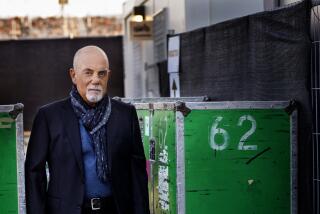Minor work, but clearly Kerouac
- Share via
POOR Jack Kerouac. Thirty-six years after his death, his executors are still scraping clean his archives, bringing every last manuscript and fragment to light. Once, this was a useful effort; when Kerouac died, at 47, he left dozens of full-length works unpublished, from the prose poem “Old Angel Midnight” to the spiritual guide “Some of the Dharma” to the exquisite verse of “Book of Blues.”
More recently, though, we’ve been reduced to “Orpheus Emerged,” a particularly forgettable bit of juvenilia, or “The Windblown World,” a selection of journal notes. Now, the Kerouac estate has authorized the release of “Beat Generation,” the author’s only known play, which is, by my count, the 20th of his books to come out posthumously -- or two more than he published while alive.
“Beat Generation” was written in late 1957, shortly after the appearance of “On the Road.” For Kerouac, “On the Road” was more burden than blessing, the book that transformed him into an icon, the two-dimensional King of the Beats. Here, he tinkers with the substance of that legend, writing about a railroad brakeman named Milo, modeled on his friend Neal Cassady, who also centers “On the Road.” The play, although never produced, remains familiar; it echoes Kerouac’s then-unpublished novel “Visions of Cody,” and certain passages were later adapted as the narration for the film “Pull My Daisy,” on which the author collaborated with photographer Robert Frank in 1959.
Although “Beat Generation” comes billed as “a major literary find,” it’s really a minor effort, meandering, unfocused, of interest as an oddity, if at all. Still, as with even the slightest of Kerouac’s writings, it bears traces of a deeper vision, one defined by both beatitude and despair. In the end, this, more than any intimation of bohemia, is what continues to give Kerouac resonance, his sense of just how sacred, sweet and lost we are. To be human, he believed, was to be cut off from the universe -- indeed, to stand apart from God. Or, as he writes early in the first act: “Well now listen here, old buddy Buck ... so it’s true as you do say, that God is us, is just us, right here, now, exactly as you say, we don’t have to run to God because we’re already there, yet Buck really now face it old buddy that ... trail to Heaven is a long trail.”
David L. Ulin is book editor of The Times.
More to Read
The biggest entertainment stories
Get our big stories about Hollywood, film, television, music, arts, culture and more right in your inbox as soon as they publish.
You may occasionally receive promotional content from the Los Angeles Times.











